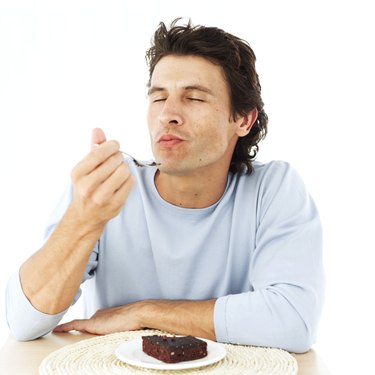
Heart palpitations, including the feeling that your heart has skipped a beat, though not necessarily serious, may startle you. They have a variety of causes, including chocolate, or more specifically, some of the compounds in chocolate. Dark chocolate provides antioxidants not found in milk chocolate or white chocolate. It also increases arterial blood flow, reduces your risk for blood clots, and boosts brain chemicals that may improve your mood. Oleic acid, a saturated fat found in dark chocolate, decreases LDL, the bad cholesterol, according to the University of Michigan Health System.
About Chocolate
Video of the Day
Chocolate comes from the dried, fermented bean of a tree called Theobroma cacao. Among other substances, chocolate contains the stimulants caffeine, theobromine and phenylethylamine as well as magnesium and tryptophan. Caffeine provides the stimulant effect in coffee that helps to keep you alert. Theobromine triggers abnormal heart rhythms, according to NYU Langone Medical Center. Phenylethylamine shares a chemical relationship with amphetamines, illegally as a stimulants. However, caffeine plays the main role in inducing palpitations.
Video of the Day
Chocolate and Caffeine
Chemicals produced by your body send signals along nerves to your cells and body tissues. This process helps trigger the breakdown of chemicals -- also called nutrients -- transported throughout your body during digestion. Caffeine blocks the chemical that signals its breakdown. As a result, caffeine's full effect continues throughout your body. Because caffeine functions as a stimulant, when it reaches your heart, caffeine triggers the release of other chemicals that increase heart muscle contractions and your heart rate, according to an article by biologist Neal J. Smatresk, Dean of the College of Science at the University of Texas at Arlington, published in the February 1999 issue of the "Scientific American" journal.
Research
Art Pollard, founder and Head Chocolate Maker of the Amano Chocolate Company, reports that while all chocolate contains caffeine, dark chocolate has the most. The higher the amount of cocoa solids in chocolate, the greater its caffeine content. According to Amano, a pound of 90 percent dark chocolate contains about 816 milligrams of caffeine. While most people may not eat that much in one sitting, even 1 ounce contains about 102 milligrams of caffeine, or about the same as drinking an 8 ounce cup of brewed coffee. One study published in the August 2004 issue of "BioMed Central Cardiovascular Disorders" noted that eating chocolate triggered palpitations in patients with known episodes of the disorder.
Considerations and Warnings
For people particularly sensitive to the effects of caffeine, even a small dose, like the amount found in chocolate, could create a problem, according to Amano and the Cleveland Clinic. If you have heart palpitations related to chocolate, consider abstaining. The Cleveland Clinic recommends that people in poor health, or those who have heart conditions, restrict their caffeine intake. If you have concerns or questions, consult a health care professional.
- Wageningen University: What is Theobromine And What is Its Effect on Human Beings?
- Amano Chocolate Company: Chocolate Does Have Caffeine
- Scientific American: How Does Caffeine Affect the Body?
- Chocolate: The Psychoactive Cocktail
- Cleveland Clinic: Arrhythmia: Heart Palpitations
- BioMed Central Cardiovascular Disorders: Arrhythmia-Provoking Factors and Symptoms at the Onset of Paroxysmal Atrial Fibrillation: A Study Based on Interviews with 100 Patients Seeking Hospital Assistance
- University of Michigan Health System: Dark Chocolate
- NYU Langone Medical Center: Chocolate
- Brown University Health Services: Caffeine
Is this an emergency? If you are experiencing serious medical symptoms, please see the National Library of Medicine’s list of signs you need emergency medical attention or call 911.